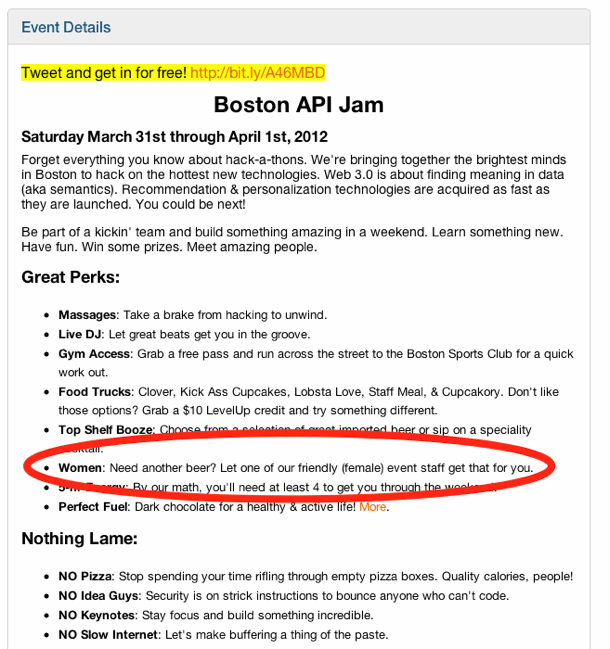Casual sexism happens all the time in software engineering. If I hear one more person say that they want to make their app easy enough for their mother or grandmother to use, I’m going to scream. Let’s stop assuming that women aren’t technical or aren’t willing to understand something. And for the love of all that is good in this world, don’t try to justify this one to me. I don’t care if your mom isn’t actually technical, you can still come up with other examples of people who aren’t technical. Don’t be lazy
Women in software engineering have to deal with this casual sexism every day, and mostly we let it go. When you hear it so often, it’s hard to identify it for what it is, and you get tired of being told that it wasn’t actually intended to be sexism. But then you get hit between the eyes with yet another example of casual sexism, such as this displayed in Sqoot’s invitation to an “API jam” in Boston:
That’s right, ladies, you’re just a perk at a hackathon, like the massages and booze.
At first, they tried the “it was just a joke” defense. It took more outcry for them to issue an apology, first by saying that they were “really sorry” (a Google Doc that now no longer exists), and then by saying that “we can do better“.
Yes, you can do better. You can realize that women aren’t a perk. You can realize that you can’t blow it off as “just a little humor”. You can realize that your first non-apology apology isn’t acceptable, and that your second attempt saying that you were just trying to “call attention to the male-dominated tech world” can’t possibly be accurate. Beer wenches call attention to beer and breasts, they’re not an attempt to address gender inequality. Would you try to make call attention to the lack of diversity by pointing out that you’ve got Latinos cleaning the bathrooms?
There’s only one acceptable apology here: “I’m sorry. I was wrong.” No explanations, no posturing, just an admission that you got it wrong. After that admission, the next step is to figure out how you got it so wrong and what you’re going to do about it. Maybe, for example, you need to reach out to local women’s developer groups to try to do something about the “male-dominated” nature of hackathons. Do something, don’t just say that “we can do better”. Tell us what that better thing is that you’re going to do, and make sure that it actually is something better. If your solution is just making sure that there are hot boys to bring pink frilly drinks, you’re still missing the point.


Two thoughts:
1) I’m more likely to say “Easy enough for my dad to use”, which doesn’t necessarily mean simple, more “works even if he never ever reads anything”. (He’s too impatient.) But that only works if whoever I’m saying it to knows him. Anyway, I’m off track. It’s a lazy fallback, and it does play to stereotypes and that’s not ok.
2) The example of “Boston API Jam” above is more… obvious, I guess, than I’m used to seeing. Usually the sexism I’ve seen, or heard about, is more personal. Or at least not written down.
I don’t know what the answer is. Sexism in all its forms are particularly tough problems to deal with because people seem so unwilling to admit they’re part of the problem. Or are even aware they are.